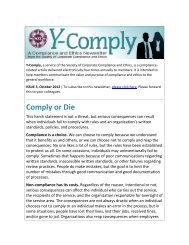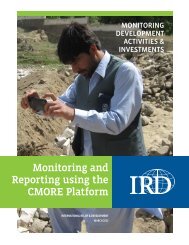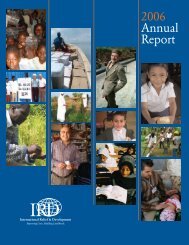Empowering citizens Engaging governments Rebuilding communities
Empowering citizens Engaging governments Rebuilding communities
Empowering citizens Engaging governments Rebuilding communities
You also want an ePaper? Increase the reach of your titles
YUMPU automatically turns print PDFs into web optimized ePapers that Google loves.
The first few years of ICAP projects<br />
directly benefited more than 20 million<br />
Iraqis and generated 23,000 long‐term<br />
jobs and 5,600 short-term jobs<br />
With the help of these community groups, IRD completed<br />
almost 2,400 ICAP projects over 2003–06,<br />
at a value of more than $73 million. The program<br />
required that 25 percent of project funds be in-kind<br />
donations from local Iraqi <strong>communities</strong>, but this<br />
number was exceeded by almost $10 million—<br />
another sign of local <strong>citizens</strong>’ eagerness to be<br />
part of the planning and development of their<br />
<strong>communities</strong>.<br />
Establishing services, assisting civilians,<br />
creating jobs<br />
Once a community action group formed, IRD mobilizers<br />
would provide basic training on rules and<br />
procedures and a condensed form of the appraisal<br />
process. With this introductory training complete,<br />
members began writing bylaws to guide their work.<br />
Again, the mobilizers oversaw and helped run this<br />
activity. Throughout the program, IRD provided training<br />
to community groups on computer skills, core<br />
business skills, first aid, and conflict mitigation. This<br />
training incentivized members to continue their participation<br />
while bolstering the groups’ ability to create<br />
quality reports and applications and recommend grant<br />
candidates to IRD.<br />
Once trained, group members helped shepherd community<br />
projects through three main program areas:<br />
• Economic and social infrastructure projects to build<br />
and repair roads and public buildings as well as<br />
restore essential services.<br />
• Business development grant support to micro,<br />
small, and medium businesses.<br />
The first few years of ICAP projects directly benefited<br />
more than 20 million Iraqis and generated 23,000<br />
long-term jobs and 5,600 short-term jobs. 4 “ICAP was<br />
a unique program, at least in Iraq because it was<br />
community-based,” al-Juboori said. “We’d reach out<br />
to the grassroots level, and at that time, no one was<br />
representing anyone. There was no effective local<br />
government. Even though neighborhoods had a lot<br />
of needs, nobody was reaching out to those people.<br />
There was no government. There was nobody.”<br />
According to al-Juboori, even after the rudimentary<br />
Baghdad councils had been established, the basic<br />
needs of ordinary <strong>citizens</strong> were often overlooked<br />
due to the rampant nepotism or favoritism that<br />
had become ingrained in Iraqi political and social<br />
structure. “Local leaders were not paying attention<br />
to everyday people,” she said. “They would focus<br />
on their relatives or close friends. It wasn’t the real<br />
people in need. And with ICAP we went directly to the<br />
people in need.”<br />
A chance for <strong>citizens</strong> to rebuild basic services<br />
Many of those people in need lived in the Sadr<br />
district, one of the poorest and most violent neighborhoods<br />
in Baghdad. With little access to basic<br />
services, residents in two districts encompassing<br />
roughly 25,000 people formed the Al Bir community<br />
action group. In its first year, the group completed<br />
15 projects ranging from the administration of small<br />
business grants to the creation of public parks and<br />
playgrounds on vacant lots. The group also organized<br />
neighborhood cleanups and public health campaigns.<br />
In a very short time, the Al Bir group became a vocal<br />
advocate for its <strong>citizens</strong>, and, in doing so, formed a<br />
critical link between individuals and their municipal<br />
government leadership.<br />
1<br />
Building community trust<br />
• Assistance to civilian victims and <strong>communities</strong><br />
injured, impaired, or otherwise negatively affected<br />
by coalition forces.<br />
As part of its effort to boost the local infrastructure<br />
and business environment, the Al Bir community group<br />
reached out to create a dialogue with its neighborhood<br />
13


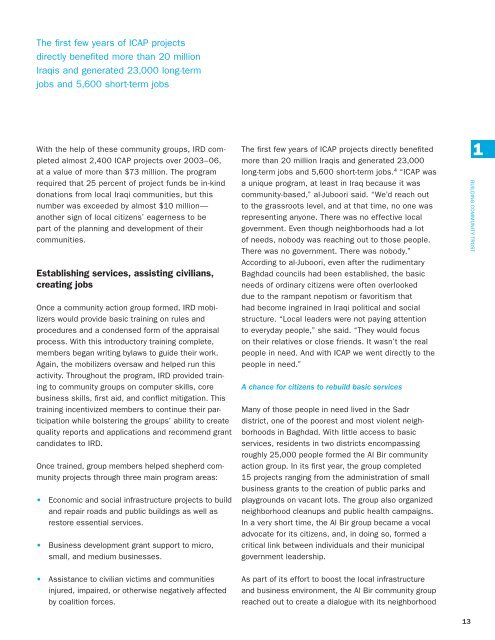
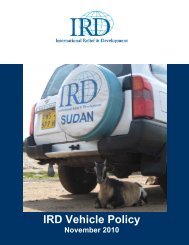
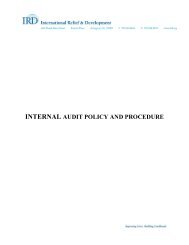
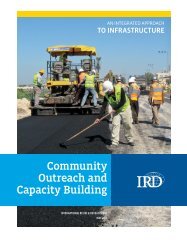
![Guide bonne pratique production d'oignon qualité_VF_4_2411012[1]](https://img.yumpu.com/23506639/1/184x260/guide-bonne-pratique-production-doignon-qualitac-vf-4-24110121.jpg?quality=85)

